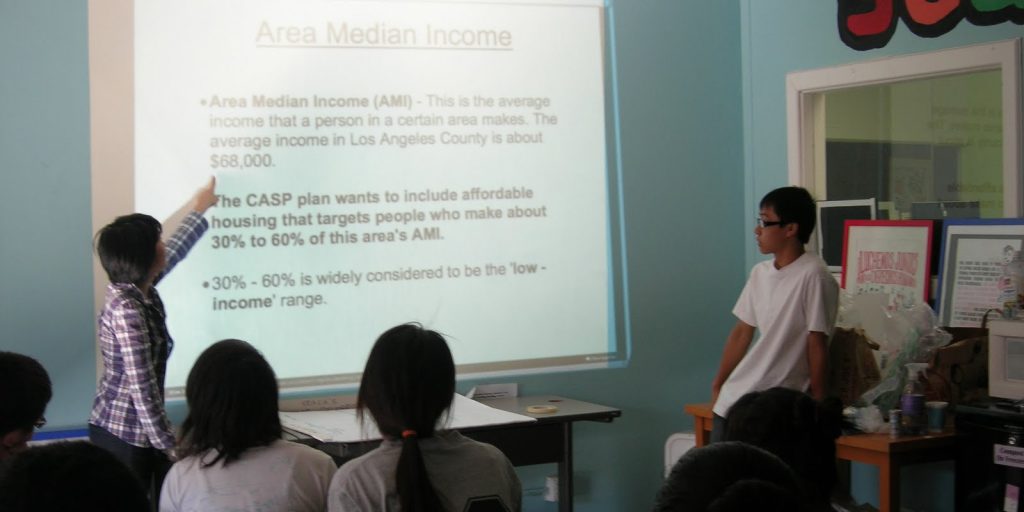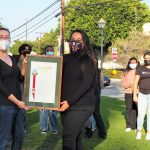SEACA started our planning journey over a decade ago… the City had released a new plan for Chinatown, Lincoln Heights, and Cypress Park called the Cornfield Arroyo-Seco Specific Plan or CASP. None of us knew what this meant, but we knew that we were going to have to fight for our low-income immigrant communities that are frequently left out of the public process. We began by Googling “how do you build affordable housing” and struggling to read the plan. Ten years later, the CASP is back for an update, and this time we have a decade’s worth of experience advocating for our community under our belt. Join us in advocating for a CASP that protects our neighbors from displacement, prioritizes housing affordable to our community, protects jobs, and makes our community a better place to live!

So what is a Specific Plan, and why is it important?
While land use planning and development can seem like an overly technical and dull topic, it is an incredibly powerful tool that determines which communities get parks and open space, and which get factories and freeway ramps.
Simply put, land use plans are the City’s tools to regulate how neighborhoods grow and change over time, what kinds of activities are allowed where, and what goals are prioritized. The City of Los Angeles regulates all of its land through 35 community plans that are periodically updated. Specific plans focus on smaller areas that are targeted for additional growth or a special set of regulations on top of what’s in the community plan. So while Chinatown development is regulated by the Downtown Community Plan, a portion of Chinatown is also regulated by the CASP.
What’s in a Community or Specific Plan?
A Community of Specific Plan is composed of a document that lays out the rules for development, and a map that shows what uses are allowed where. It includes:
- Goals and Objectives of the plan
- Programs and policies for achieving those goals
- What kinds of uses are allowed, restricted, or prohibited
- Guidelines for how new buildings should look
- A map that shows what can be built where
When someone wants to build a new project, they have to comply with what the plan allows and show that their project meets the goals and objectives of the plan.
What exactly is the CASP and what is it supposed to do?
CASP was originally envisioned as a plan to protect the existing jobs in the neighborhood, increase access to parks, and encourage public transit use. One of the key issues for the community was the need to protect the industrial sector from gentrifying. CASP stretches from the northern part of Chinatown to the 5 Freeway in Lincoln Heights and 110 Freeway in Cypress Park. This largely industrial area provides employment opportunities for our community members in the warehouses and manufacturing facilities. Developers exploit the relatively cheap industrial land to drive gentrification into low-income communities by turning industrial and manufacturing facilities into cafe’s, studio space, and art galleries. CASP has been called “A Model for Planning” because it was formulated to address community needs and with community input in mind. Without CASP, gentrification would have overrun our community even more than it already has. CASP helped to limit the luxury development that kills jobs, undermines our community-serving small businesses, and puts our low-income seniors and families at increased risk of homelessness.
Because of SEACA’s advocacy, CASP became the FIRST plan in Los Angeles to proactively deal with the issue of gentrification and displacement of our families by creating incentives for private developers to build affordable housing. In the new update process the City wants to tweak the affordable housing incentives to ensure production of much needed affordable housing in our community.
Affordable Housing
The term affordable housing can be used by different people to mean different things, the key question is ‘affordable for whom?’ The term generally means that the rent is restricted to families of specific income levels, so the landlord cannot charge a higher rent if they wanted to. However, in Los Angeles the cost of housing is so high, that ‘affordable housing’ can refer to housing mean for households making $90,000 a year.
When we say ‘affordable housing’ we mean homes affordable to the existing community residents. For example in Chinatown, this would be homes affordable to residents making $25,000 or below.
So, whenever someone brings up affordable housing, always ask the question ‘affordable for whom?’
How do I participate in the CASP update process?
Because of CASP’s success in protecting employment for our community and prioritizing affordable housing development, the current CASP update is not an entire redo of the plan, but a targeted update to the policies that bring it in line with our 2021 realities. Join SEACA and community groups in advocating for a CASP that protects jobs, prioritizes affordable housing, and serves our low-income refugee and immigrant families.
Here is what we’re looking for in the new CASP update:
- Any adjustments to the affordable housing incentives must build upon existing tools and prioritize housing for our most vulnerable/low-income community members
- Should continue and expand anti-displacement protections
- Protect and support our community-serving small businesses
- Continue to protect jobs in the community
- Improve air quality by prioritizing the need of transit-dependent low-income residents
- Center racial equity in the plan update process and ensure racially just outcomes
- Center the expertise of the community through targeted and inclusive public engagement process
Join the City’s CASP Open House
Wednesday, November 3, 2021 at 5:00pm
Zoom:https://planning-lacity-org.zoom.us/j/82073195936 (must join via zoom for translation)
Phone: (213) 338-8477; Meeting ID: 820 7319 5936
Participants will be asked for a Meeting ID, enter “(820 7319 5936)”, followed by “#”. Participants will be asked to enter a participant ID, enter “#” to continue.
Check out the City’s CASP website and sign up to receive the Updates
Follow SEACA on social media or email yelena@seaca-la.org if you want to stay involved but can’t attend the Open House


